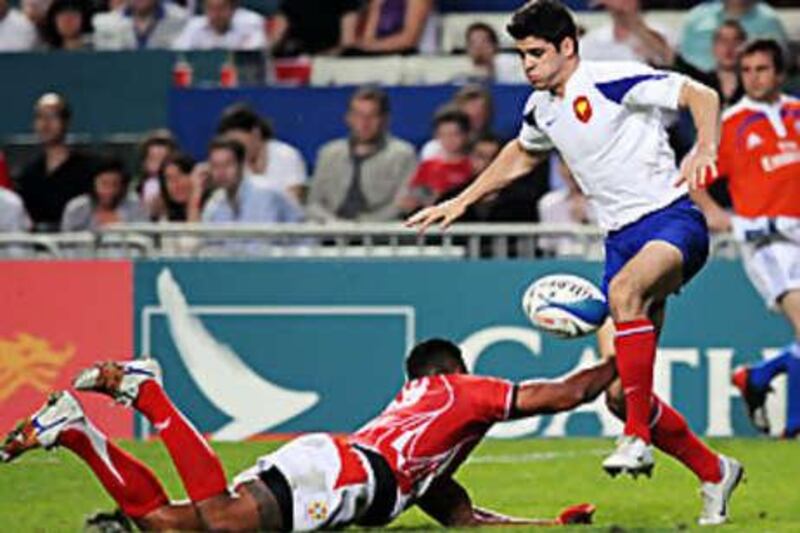DUBAI // The repeated failure of France to get to grips with sevens is one of the enduring mysteries of rugby union's abbreviated form. With a long-standing tradition for style and panache in the 15-man game, they should be perennial champions in rugby's most attack-friendly mode.
Yet success has never followed. In last year's IRB Sevens World Series, France finished below Kenya, Scotland and Tonga, and just four points ahead of the minnows from the Cook Islands. They have never had their hands on the Emirates International Trophy - although their top club team Toulouse did win an early version of the Dubai Rugby Sevens. However, the established order may be changing. The French union recently implemented a number of changes, in a bid to address their sevens inertia and make them a force at the World Cup in Dubai next March.
For the first time the French coach, Thierry Janeczek, will be bringing two full squads to Dubai. The IRB Series side will still be made up of the usual gang of talented young tyros, supplemented by the odd sevens specialist loaned from clubs in the second or third division of the French league. However, there will also be a second string, playing under the guise of Les Bleus Sevens in the International Invitational competition, as Janeczek attempts to create a greater pool of players feeding into his national team.
According to Franck Mesnel, the former France fly-half, the game's traditional forces should watch out. "We should have a good team, but we have not taken it very seriously until now," he says. "But now that everything is becoming professional, I don't think it will be long before we are good. "It is the French way - we should have a good running team. I hope that for the next World Cup in 2009 we will have that.
"In the 15s, players have become more specialised. There are not so many small and fast players in that form any more, so I think it is important they play sevens." Mesnel should know. During his playing days, he took the idea of attacking rugby to ridiculous lengths while playing for Racing Club de Paris and the French national team. His Racing side became so committed to entertaining, they even played matches wearing gold shoes and pink bow-ties.
Once, the entire back-line wore black body paint in tribute to one of their Guinean players, whose birthday it was. All that pomp was an antidote to a slump at the club, according to Mesnel. "At that time we were losing each game by 40 points, and being punched every Saturday," he recalls. "It was important we changed that because it is no fun going home every Saturday with a black eye and 40-points on your back.
"We didn't have strong forwards, but we saw our backs were fast. So we decided to change our strategy. "Off the field we were just crazy students, trying to finish our studies. Then we played with our faces painted black in Toulouse, then we played with our shoes painted gold. Then the sports press called us Le Showbizz." The days of such high-jinx may be long gone - but Mesnel believes the spirit of entertainment lives on in tournaments like the Dubai Rugby Sevens. "Sevens is here to find solutions," said Mesnel, 47, who played in three World Cups.
"Take a team like the Japanese. They cannot use their forwards or their power because they don't have it. So they have to move the ball faster and be more precise. "In the modern game the professional players have become very powerful. In the future they can be more precise." pradley@thenational.ae






